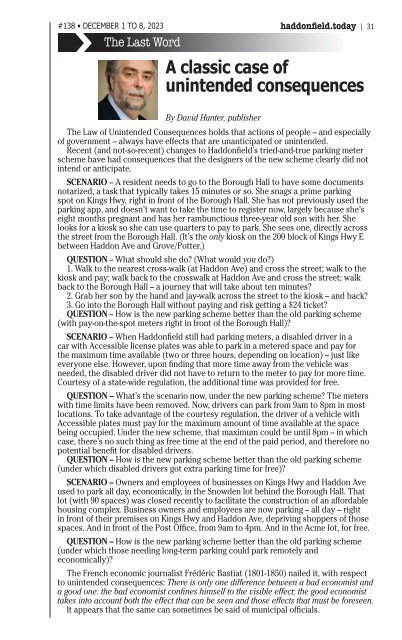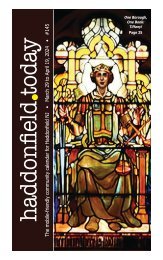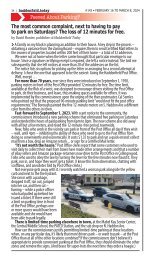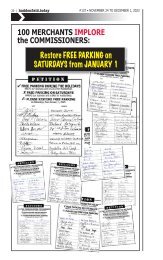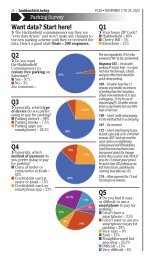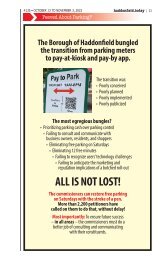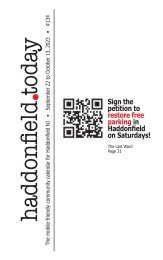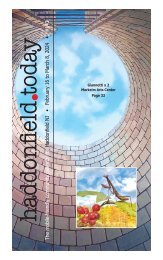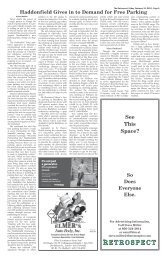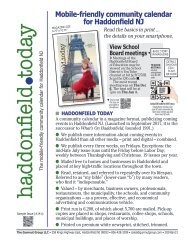Haddonfield Today 138_2023Dec01_Parking
You also want an ePaper? Increase the reach of your titles
YUMPU automatically turns print PDFs into web optimized ePapers that Google loves.
#<strong>138</strong> • DECEMBER 1 TO 8, 2023<br />
The Last Word<br />
haddonfield.today | 31<br />
A classic case of<br />
unintended consequences<br />
By David Hunter, publisher<br />
The Law of Unintended Consequences holds that actions of people – and especially<br />
of government – always have effects that are unanticipated or unintended.<br />
Recent (and not-so-recent) changes to <strong>Haddonfield</strong>’s tried-and-true parking meter<br />
scheme have had consequences that the designers of the new scheme clearly did not<br />
intend or anticipate.<br />
SCENARIO – A resident needs to go to the Borough Hall to have some documents<br />
notarized, a task that typically takes 15 minutes or so. She snags a prime parking<br />
spot on Kings Hwy, right in front of the Borough Hall. She has not previously used the<br />
parking app, and doesn’t want to take the time to register now, largely because she’s<br />
eight months pregnant and has her rambunctious three-year old son with her. She<br />
looks for a kiosk so she can use quarters to pay to park. She sees one, directly across<br />
the street from the Borough Hall. (It’s the only kiosk on the 200 block of Kings Hwy E<br />
between Haddon Ave and Grove/Potter.)<br />
QUESTION – What should she do? (What would you do?)<br />
1. Walk to the nearest cross-walk (at Haddon Ave) and cross the street; walk to the<br />
kiosk and pay; walk back to the crosswalk at Haddon Ave and cross the street; walk<br />
back to the Borough Hall – a journey that will take about ten minutes?<br />
2. Grab her son by the hand and jay-walk across the street to the kiosk – and back?<br />
3. Go into the Borough Hall without paying and risk getting a $24 ticket?<br />
QUESTION – How is the new parking scheme better than the old parking scheme<br />
(with pay-on-the-spot meters right in front of the Borough Hall)?<br />
SCENARIO – When <strong>Haddonfield</strong> still had parking meters, a disabled driver in a<br />
car with Accessible license plates was able to park in a metered space and pay for<br />
the maximum time available (two or three hours, depending on location) – just like<br />
everyone else. However, upon finding that more time away from the vehicle was<br />
needed, the disabled driver did not have to return to the meter to pay for more time.<br />
Courtesy of a state-wide regulation, the additional time was provided for free.<br />
QUESTION – What’s the scenario now, under the new parking scheme? The meters<br />
with time limits have been removed. Now, drivers can park from 9am to 8pm in most<br />
locations. To take advantage of the courtesy regulation, the driver of a vehicle with<br />
Accessible plates must pay for the maximum amount of time available at the space<br />
being occupied. Under the new scheme, that maximum could be until 8pm – in which<br />
case, there’s no such thing as free time at the end of the paid period, and therefore no<br />
potential benefit for disabled drivers.<br />
QUESTION – How is the new parking scheme better than the old parking scheme<br />
(under which disabled drivers got extra parking time for free)?<br />
SCENARIO – Owners and employees of businesses on Kings Hwy and Haddon Ave<br />
used to park all day, economically, in the Snowden lot behind the Borough Hall. That<br />
lot (with 90 spaces) was closed recently to facilitate the construction of an affordable<br />
housing complex. Business owners and employees are now parking – all day – right<br />
in front of their premises on Kings Hwy and Haddon Ave, depriving shoppers of those<br />
spaces. And in front of the Post Office, from 9am to 4pm. And in the Acme lot, for free.<br />
QUESTION – How is the new parking scheme better than the old parking scheme<br />
(under which those needing long-term parking could park remotely and<br />
economically)?<br />
The French economic journalist Frédéric Bastiat (1801-1850) nailed it, with respect<br />
to unintended consequences: There is only one difference between a bad economist and<br />
a good one: the bad economist confines himself to the visible effect; the good economist<br />
takes into account both the effect that can be seen and those effects that must be foreseen.<br />
It appears that the same can sometimes be said of municipal officials.


